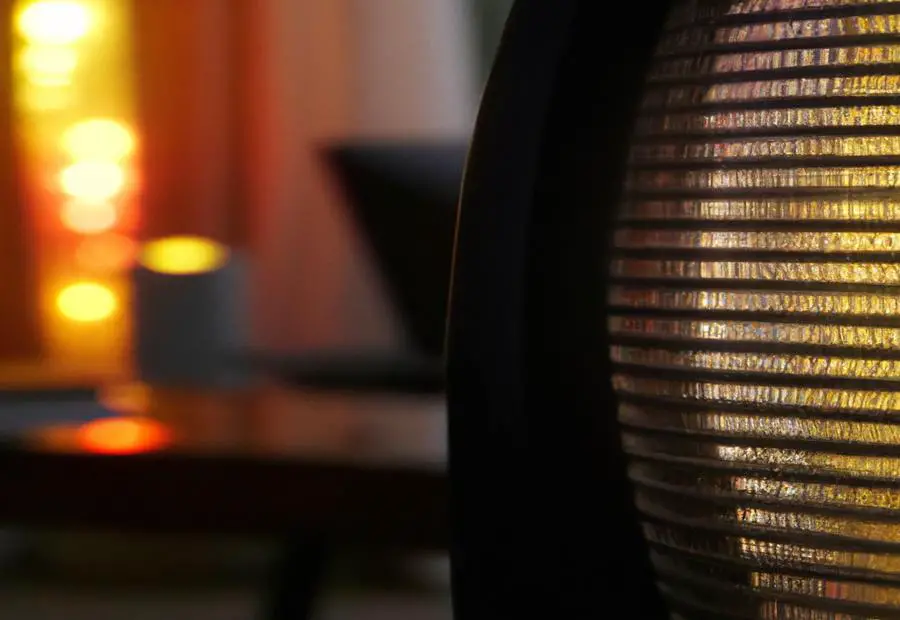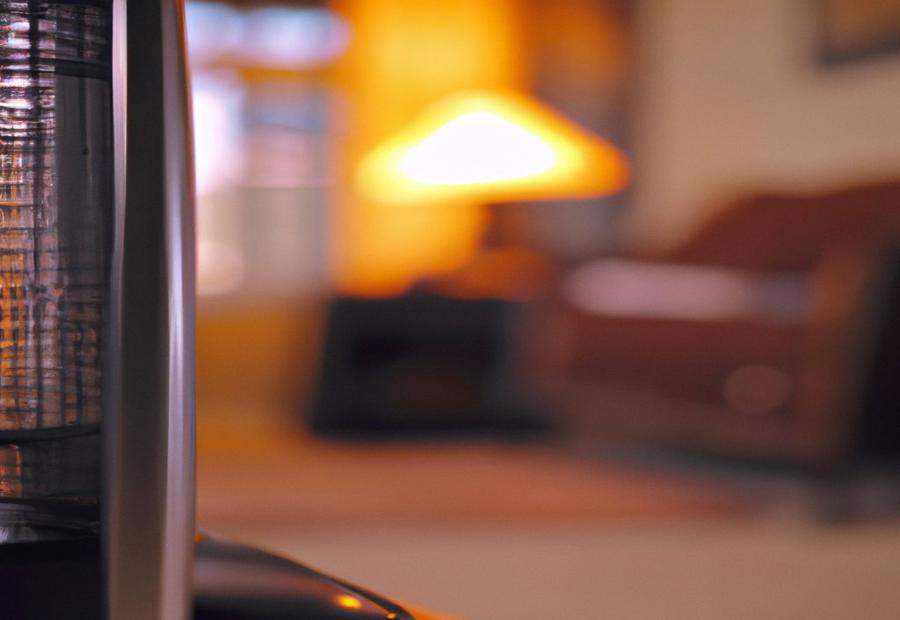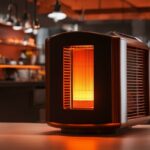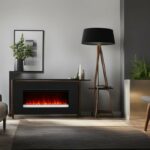Last Updated on 9 months by Francis
.jpg)
Electric heaters are a popular choice for providing warmth and comfort during colder months. However, safety is a paramount concern when using any heating device, especially when leaving it unattended. Understanding the safest electric heater options and taking necessary precautions is crucial to prevent any accidents or mishaps.
In this article, we will delve into the topic of electric heaters and the safety measures that need to be considered when leaving them unattended. We will explore the features that make an electric heater safe, the risks associated with leaving them unattended, and provide tips for safely leaving an electric heater without compromising safety. By following these guidelines, you can enjoy the warmth of your electric heater with peace of mind.
- Choose an electric heater with built-in safety features, such as automatic shut-off and overheating protection, to minimize the risk of accidents.
- Place the electric heater in a stable, open area away from flammable materials to ensure maximum safety.
- Regularly inspect and maintain the electric heater to prevent any potential hazards and ensure its safe operation.
Contents
What is the Safest Electric Heater?
When considering what is the safest electric heater, there are several factors to keep in mind:
- Choose a heater with built-in safety features such as tip-over protection and overheat protection.
- Look for a heater with a cool-touch exterior to prevent burns.
- Select a heater with a sturdy and stable base to prevent tipping over.
- Opt for a heater with a thermostat and programmable timer to regulate the temperature and prevent overheating.
- Ensure that the heater has been tested and certified by a recognized safety organization like UL or CSA.
Remember, the safest electric heater is one that is used responsibly and with caution. Always follow the manufacturer’s instructions and never leave the heater unattended.
Fact: According to the National Fire Protection Association, heating equipment is one of the leading causes of home fire deaths. It is crucial to prioritize safety when using electric heaters.
Which Features Make an Electric Heater Safe?
When it comes to ensuring the safety of an electric heater, there are several features to consider:
- Overheat protection: Look for an electric heater that has overheat protection built-in. This feature helps to prevent the heater from overheating, reducing the risk of fire.
- Tip-over switch: A tip-over switch is an important safety feature that automatically shuts off the heater if it is accidentally knocked over. This helps to prevent fires and other accidents.
- Cool-to-touch exterior: A cool-to-touch exterior is essential for preventing burns. Choose an electric heater that stays cool on the outside, even when in use.
- Child lock: If you have children or pets at home, consider an electric heater with a child lock feature. This feature prevents accidental changes to the settings and helps to keep everyone safe.
- Automatic shut-off timer: An automatic shut-off timer allows you to set a specific time for the heater to turn off. This is useful if you want to ensure the heater doesn’t run for extended periods of time, reducing the risk of overheating.
These features make an electric heater safe to use and minimize the risk of accidents or injuries.
A few years ago, my friend had an old electric heater without any safety features. One night, she accidentally knocked it over while it was running. The heater started to emit sparks and smoke, quickly filling the room with a burning smell. Luckily, she was able to unplug it and put out the small fire before it caused any major damage. This incident made her realize the importance of choosing an electric heater with safety features to prevent such incidents in the future.
Can Electric Heaters be Left Unattended?

Photo Credits: Infraredforhealth.Com by Austin Miller
Electric heaters should never be left unattended as it can pose serious safety risks. The question of whether electric heaters can be left unattended is crucial to address. Leaving an electric heater unattended increases the chances of fire hazards and potential damage to property. It is important to remember that accidents can happen at any time and it only takes a few minutes for a fire to start. Always ensure that someone is present in the room where the electric heater is being used and that it is turned off before leaving or going to sleep. Taking these precautions can significantly reduce the risk of any untoward incidents. Stay vigilant and prioritize safety when using an electric heater.
What are the Risks of Leaving an Electric Heater Unattended?
What are the Risks of Leaving an Electric Heater Unattended?
Leaving an electric heater unattended can result in significant risks, including fire hazards and potential damage to property and belongings. The absence of supervision allows for the possibility of a malfunctioning heater overheating, which can then lead to the ignition of nearby flammable materials and the occurrence of a fire. This risk becomes even greater when the heater is placed in close proximity to curtains, furniture, or other objects that are easily combustible.
Another danger of leaving an electric heater unattended is the potential for it to tip over. In such a situation, the heater may make contact with flammable materials or cause burns and injuries if someone were to accidentally touch its hot surface.
Moreover, leaving the heater unattended can result in wastage of energy. To prevent unnecessary electricity consumption and minimize the risk of electrical malfunctions, it is recommended to turn off or unplug the heater when not in use.
To mitigate these risks, it is crucial to adhere to safety guidelines while using electric heaters. This includes ensuring that the heater is placed in a well-ventilated and stable location, away from any materials that are prone to catching fire. It is also advisable to utilize features such as timers or automatic shut-off functions and regularly inspect and maintain the heater for any indications of damage or malfunction.
By being aware of the risks involved and implementing necessary precautions, individuals can ensure the safe usage of electric heaters and reduce the likelihood of accidents or fires.
Choose a Heater with Built-in Safety Features
When it comes to selecting an electric heater, it is crucial to prioritize safety by choosing a heater that comes with built-in safety features. Here are a few key features to consider:
- Automatic shut-off: It is important to opt for a heater that automatically shuts off if it reaches a certain temperature or is accidentally tipped over. This feature helps prevent overheating and minimizes the risk of fire.
- Cool-touch exterior: Especially if you have children or pets at home, it is advisable to choose a heater that has a cool-touch exterior. This feature ensures that the surface remains cool to the touch, reducing the potential for burns and accidental injuries.
- Thermostat control: A heater equipped with thermostat control allows you to set and maintain your desired temperature. This not only prevents overheating but also promotes energy efficiency.
- Overheat protection: It is essential to ensure that the heater is equipped with an overheat protection feature that automatically shuts off the unit if it exceeds a safe temperature limit. This feature provides an extra layer of safety.
- Tip-over protection: Look for a heater that includes a tip-over switch, which immediately powers off the unit if it accidentally gets knocked over. This feature helps prevent potential accidents and ensures safety.
- UL certification: When making your selection, prioritize heaters that have obtained UL (Underwriters Laboratories) certification. This certification guarantees that the heater has undergone rigorous safety and reliability testing.
By carefully considering these essential safety features and selecting a heater that incorporates them, you can have peace of mind, knowing that you have made safety a top priority in your home.
Place the Heater in an Open and Stable Area
When using an electric heater, it is crucial to place the heater in an open and stable area to promote adequate air circulation and reduce the chances of accidents or overheating.
- Select a flat and stable surface to position the heater. Avoid placing it on uneven or wobbly surfaces that might cause it to tip over.
- Ensure there is sufficient space around the heater. Keep it at least three feet away from any furniture, curtains, or other flammable materials.
- Avoid placing the heater near doorways, walkways, or areas where it can obstruct the flow of foot traffic.
- Keep the heater away from water sources like sinks or bathtubs to prevent electrical hazards.
- Make sure the heater is positioned in an area with proper ventilation. Avoid placing it in enclosed spaces or near objects that could obstruct airflow.
- Regularly check the surrounding area for any obstructions or objects that may have accidentally been placed too close to the heater. Clear away any obstacles to maintain an open area around the heater.
By following these steps and placing the heater in an open and stable area, you can ensure its proper functioning and minimize the risk of accidents or damage.
Keep Flammable Materials Away
-
When using an electric heater, it is essential to prioritize safety by keeping flammable materials away. Here are some steps to follow:
-
Clear the area around the heater of any flammable items such as curtains, papers, or furniture.
-
Avoid placing the heater near combustible materials like gasoline, cleaning chemicals, or aerosol cans.
-
Ensure that there are no loose or hanging fabrics near the heater, such as clothing or blankets.
-
Keep the heater away from any flammable liquids or objects that can easily catch fire.
-
Avoid using the heater in areas where there is a high risk of flammable materials, such as garages or storage rooms.
-
If using an electric heater with an open flame, make sure it is placed in a sturdy and secure location, away from flammable materials.
-
Regularly inspect the surrounding area and remove any potential fire hazards.
By following these precautions and consistently keeping flammable materials away, you can minimize the risk of fire and ensure the safe use of your electric heater.
Set a Timer or Automatic Shut-off
When using an electric heater, it is important to incorporate safety measures such as setting a timer or using an automatic shut-off feature. Here are some steps to follow:
- Check if the heater has a built-in timer or automatic shut-off feature. Some electric heaters are equipped with timers or automatic shut-off functions that allow you to set a specific time for the heater to turn off. This can be useful if you want to ensure that the heater does not run for longer than necessary.
- If the heater does not have a built-in timer or automatic shut-off, consider using a plug-in timer. A plug-in timer can be connected to the power outlet and set to turn off the heater after a certain period of time. This provides an added layer of safety and helps prevent overheating.
- Set the timer or automatic shut-off to an appropriate time. Determine the duration for which you would like the heater to run and set the timer or automatic shut-off accordingly. This can help conserve energy and prevent accidents caused by prolonged heater usage.
- Regularly check and adjust the timer or automatic shut-off settings. Make sure that the timer or automatic shut-off is functioning correctly by periodically checking and adjusting the settings as needed. This ensures that the heater turns off when it is supposed to.
- Monitor the heater’s performance. Keep an eye on the heater while it is running and ensure that it is working properly. If you notice any unusual behavior, such as strange noises or overheating, turn off the heater immediately and seek professional assistance if necessary.
By following these steps and utilizing a timer or automatic shut-off feature, you can enhance the safety of using an electric heater and minimize the risks associated with leaving it unattended.
Regularly Inspect and Maintain the Heater
Regularly inspecting and maintaining your electric heater is essential for ensuring its safe and efficient operation.
-
Regularly inspect and maintain the heater: Dust and debris can accumulate in the heater, affecting its performance and potentially causing a fire hazard. Regularly inspect and clean the exterior and vents of the heater using a soft cloth or brush.
-
Check for damage: Regularly inspect and maintain the power cord, plug, and any visible components for any signs of damage such as frayed wires or loose connections. If any damage is found, discontinue use and have the heater repaired by a professional.
-
Test the safety features: Ensure that the heater’s safety features, such as tip-over protection and overheating protection, are working properly. Regularly test these features according to the manufacturer’s instructions.
-
Inspect the heating elements: Regularly inspect and maintain the exposed heating elements of your heater for any signs of wear or damage. Replace any damaged or worn-out elements to prevent malfunctions.
-
Check for proper airflow: Regularly ensure that the heater’s airflow is not blocked by any obstructions such as furniture or curtains. Proper airflow is crucial for optimal performance and preventing overheating.
-
Review the user manual: Regularly familiarize yourself with the manufacturer’s recommendations for maintenance and regularly follow their instructions for any specific maintenance procedures or intervals.
Regularly inspecting and maintaining your electric heater will not only prolong its lifespan but also ensure that it operates safely and effectively.
What is the Safest Space Heater?

Photo Credits: Infraredforhealth.Com by Brandon Robinson
Looking for the safest space heater? Look no further! In this section, we’ll uncover the key features and types of safe space heaters that you need to know about. We’ll also explore the top recommended models that prioritize your safety without compromising functionality. Worried about price? We’ve got you covered with insights on whether higher price tags truly equate to enhanced safety. Stay informed and choose your safe space heater wisely!
Types of Safe Space Heaters
When it comes to safe space heaters, there are Types of Safe Space Heaters to choose from depending on your needs and preferences. Here are some examples:
| Infrared heaters | These heaters use infrared radiation to heat objects and people in the room. They are safe to touch and do not pose a fire hazard. |
| Ceramic heaters | These heaters have ceramic plates and an electric current passes through them, generating heat. They are safe to touch and often come with built-in safety features like automatic shut-off. |
| Oil-filled heaters | These heaters use electricity to heat oil sealed within the unit. The oil retains heat and releases it slowly, making them energy-efficient and safe to use. |
| Convection heaters | These heaters warm the air in the room through natural convection. They do not have exposed heating elements, making them safe for households with children or pets. |
| Radiant heaters | These heaters emit heat using a heating element and reflectors. They are designed to heat small areas directly, making them an efficient and safe option. |
Each type of safe space heater has its own advantages and considerations. It’s important to choose the one that best suits your needs and ensure you follow all safety guidelines provided by the manufacturer.
Features to Look for in a Safe Space Heater
When looking for a safe space heater, here are some features to look for:
- Features to Look for in a Safe Space Heater – Tip-over switch: Choose a heater with a tip-over switch that automatically turns off the unit if it is accidentally knocked over. This helps prevent accidents and reduces the risk of fire.
- Features to Look for in a Safe Space Heater – Overheat protection: Look for a space heater that has built-in overheat protection. This feature automatically shuts off the heater if it reaches a certain temperature, preventing it from overheating and potentially causing a fire.
- Features to Look for in a Safe Space Heater – Cool-to-touch surface: Opt for a heater with a cool-to-touch surface to prevent burns. This ensures that even if the heater has been running for a while, the exterior remains safe to touch.
- Features to Look for in a Safe Space Heater – Timer function: A space heater with a timer allows you to set specific operating times. This can be useful if you want to heat a room before you wake up or arrive home, and then have it automatically turn off.
- Features to Look for in a Safe Space Heater – Adjustable thermostat: Look for a heater with an adjustable thermostat that allows you to set and maintain a desired temperature. This helps prevent overheating and allows for energy-efficient operation.
By considering these features, you can find a safe space heater that provides warmth while minimizing the risks associated with using an electric heater.
Pro tip: It’s always important to follow the manufacturer’s instructions and safety guidelines when using a space heater. Regularly inspect the unit for any signs of damage or wear, and never leave a space heater unattended. Safety should always be the top priority when using any heating device.
Recommended Safe Space Heaters
When it comes to choosing a safe space heater, it’s important to consider certain features and options. Here are some recommended safe space heaters:
- Electric Ceramic Space Heater: These heaters use ceramic elements to provide heat and are known for their safety features like overheat protection and tip-over shut-off.
- Oil-Filled Radiator Heater: These heaters use oil to generate heat and are a safe option as they don’t have exposed heating elements. They also often have features like thermostat control and automatic shut-off.
- Infrared Quartz Heater: With infrared heating technology, these heaters emit heat more efficiently and evenly. They often have cool-touch exteriors and safety features like automatic shut-off in case of overheating.
- Fan-Forced Convection Heater: These heaters use a fan to distribute heat throughout the room. Look for models with safety features such as cool-touch housing, tip-over protection, and overheat protection.
When considering safe space heaters, it’s important to remember that no matter what type you choose, always follow the manufacturer’s instructions for safe usage. Keep the heater away from flammable materials, place it on a stable surface, and never leave it unattended. Regularly inspect and maintain the heater to ensure it is in good working condition. By selecting a safe space heater and taking proper precautions, you can enjoy warmth and comfort while prioritizing safety.
Higher Price vs. Enhanced Safety
“
When it comes to choosing a safe electric heater, considering the higher price versus enhanced safety is important. Quality of materials is one factor to consider. Higher-priced electric heaters often use high-quality materials in their construction, ensuring better durability and reducing the risk of malfunctions.
Another factor to consider is the presence of advanced safety features. Expensive electric heaters typically come equipped with features such as overheat protection, tip-over shut-off, and child locks, which provide an additional layer of safety.
Moreover, certifications and standards play a role in ensuring safety. Costly electric heaters are more likely to meet strict industry safety standards and hold certifications from reputable organizations, guaranteeing adherence to rigorous safety criteria.
Additionally, longevity and warranty should be considered. Higher-priced models often come with longer warranties, giving peace of mind in knowing that the manufacturer stands by the product’s safety and performance.
While not directly related to safety, energy efficiency is also important. Expensive electric heaters tend to be more energy-efficient, reducing the risk of electrical issues and overall safety hazards.
”
Safety Tips for Using Electric Heaters
Keep your home cozy and warm while ensuring safety with these essential tips for using electric heaters. From responsible handling and usage to avoiding fire hazards, protecting sensitive devices, and regular maintenance and care, this section has got you covered. Discover how to make the most of your electric heater without compromising on safety. Stay informed and protect your loved ones with these valuable insights.
Responsible Handling and Usage
Responsible handling and usage of electric heaters is crucial for ensuring safety. There are several key practices to follow. Firstly, always keep an eye on the heater when it is in use. Avoid leaving it unattended for long periods to prevent any potential hazards. Also, remember to turn off the heater when leaving the room or going to sleep, as this reduces the risk of accidents.
Secondly, it is important to place the heater on a stable and flat surface to prevent it from tipping over. Do not place it near any flammable materials such as curtains, furniture, or papers. Keeping the area around the heater clear and free of clutter further minimizes fire risks.
Thirdly, read and follow the manufacturer’s instructions for the specific heater model you are using. This includes using the correct outlets and extension cords to avoid overloading the electrical circuits.
Lastly, regular maintenance and cleaning of the heater is necessary to ensure proper functioning. Clean any dust buildup on the heater’s surface and check for any visible damages or loose components. If any issues are found, have the heater inspected or repaired by a professional.
By responsibly handling and using electric heaters, you can ensure a safe environment while enjoying the warmth they provide.
Avoiding Fire Hazards
When it comes to electric heaters, one crucial aspect to consider is ensuring the safety of your home and loved ones by avoiding fire hazards. Avoiding fire hazards is of utmost importance. Here are some valuable tips to help you minimize the risk of fire when using an electric heater:
1. Keep flammable materials away: It is essential to maintain a safe distance between the heater and any flammable materials such as curtains, blankets, or papers. By keeping a clear space around the heater, you significantly reduce the chance of accidental fires.
2. Choose a heater with built-in safety features: When selecting an electric heater, prioritize models that come with built-in safety features like tip-over protection and overheat protection. These mechanisms automatically shut off the heater if it is knocked over or becomes too hot, effectively preventing potential fire hazards.
3. Regularly inspect and maintain the heater: It is advisable to regularly check the power cord and plug of the heater for any damage. If you notice any frayed wires or other issues, it is crucial to discontinue use immediately and have the heater repaired or replaced. Additionally, make sure to clean the heater regularly to prevent the accumulation of dust, which can lead to overheating.
4. Responsible handling and usage: Always adhere to the manufacturer’s instructions regarding the proper usage and handling of the electric heater. Avoid using extension cords and instead plug the heater directly into a wall outlet. Furthermore, it is essential never to leave the heater unattended, especially when leaving the house or going to sleep.
By following these tips and exercising caution, you can effectively minimize the risk of fire hazards associated with electric heaters. This ensures the safety of your home and loved ones.
Protecting Sensitive Devices
When using electric heaters, it is crucial to take precautions in order to protect sensitive devices that may be nearby. Here are some useful tips to ensure the safety of your devices:
- Keep a safe distance: Always keep sensitive devices such as laptops, smartphones, or tablets at a safe distance from the heater to prevent overheating or any potential damage.
- Utilize surge protectors: It is highly recommended to connect your sensitive devices to surge protectors. This will effectively safeguard them from power surges or fluctuations that can be caused by the electric heater.
- Avoid direct airflow: Make sure to position your sensitive devices away from the direct airflow of the heater. Exposing them to a constant and concentrated blast of hot air can result in overheating and potential damage.
- Consider using shielding: If necessary, you can utilize a heat shield or barrier to divert the airflow away from your sensitive devices. This will effectively minimize the risk of any heat-related issues.
- Regular temperature monitoring: It is important to regularly monitor the temperature of your sensitive devices to ensure that they are operating within safe limits. If they feel excessively hot, promptly move them further away from the heater.
By following these guidelines, you can effectively protect your sensitive devices from any potential damage while using an electric heater.
Regular Maintenance and Care
Regular maintenance and care are crucial for ensuring the safe and efficient operation of electric heaters. To help you maintain your electric heater properly, consider the following steps:
- Clean the heater: Regularly dust and clean the heater to prevent the buildup of dust and debris, which can be a fire hazard.
- Inspect for damages: Check the heater for any signs of damage, such as frayed cords or loose connections. If you notice any issues, avoid using the heater and have it repaired or replaced.
- Check for proper ventilation: Ensure that the heater is placed in an area with adequate ventilation to prevent overheating.
- Test safety features: Periodically test the safety features of the heater, such as the automatic shut-off or tip-over protection, to ensure they are functioning correctly.
- Keep a safe distance: Maintain a safe distance between the heater and any flammable materials to prevent fire hazards.
- Follow the manufacturer’s instructions: Always refer to the manufacturer’s guidelines for specific maintenance recommendations for your electric heater.
Regular maintenance and care will not only prolong the lifespan of your electric heater but also ensure its safe operation. By taking these steps, you can enjoy the warmth and comfort provided by your electric heater with peace of mind.
In a true story, a family diligently maintained their electric heater by cleaning it regularly and testing its safety features. One winter night, they noticed a burning smell coming from the heater. Thanks to their maintenance efforts, they quickly turned off the heater and called for assistance. It was discovered that a small piece of debris had become lodged in the heating element, posing a fire risk. By catching the issue early, they prevented a potential disaster and learned the importance of regular maintenance and care.
Some Facts About Safest Electric Heaters to Leave Unattended:
- ✅ Leaving heaters unattended can be dangerous as they can cause fires and carbon monoxide poisoning. (Source: our Team)
- ✅ Some of the safest heaters to leave on overnight include the Dyson heater, Vornado TAVH10 Electric Space Heater, portable infrared space heaters, and the Asterion space heater. (Source: our Team)
- ✅ Safety precautions when leaving heaters unattended include keeping flammable materials away from the heater, purchasing heaters with tip-over and overheat protections, plugging the heater directly into an outlet, installing smoke alarms and carbon monoxide detectors, fully plugging the heater into the socket, not placing anything on the heater, and avoiding placing the heater in areas with high foot traffic. (Source: our Team)
- ✅ Electric heaters are the safest type of portable heaters to use indoors. (Source: our Team)
- ✅ Space heaters can be left on all night if they have safety features such as tip-over protection and overheating protection. (Source: our Team)
Frequently Asked Questions
1. Can I leave an electric heater unattended for long periods of time?
Answer: Yes, you can leave some electric heaters unattended for extended periods as long as they have safety features like tip-over and overheating protection. It is important to choose a heater with these safety features and follow all safety precautions when leaving it unattended.
2. What are some of the safest portable heaters to leave unattended?
Answer: Some of the safest portable heaters to leave unattended include the AirNmore Comfort Deluxe Space Heater, Dr. Infrared Heater Portable Space Heater, Asterion indoor electric space heater, Comfort Zone Oscillating Space Heater, Vornado MVH Vortex Heater, and Lasko 755320 Ceramic Space Heater. These heaters have safety features such as tip-over protection, cool-to-touch surfaces, and built-in thermostats.
3. Are oil-filled heaters safe to leave unattended?
Answer: Yes, oil-filled heaters are safe to leave unattended as long as they are in a safe location and the thermostat is working correctly. These heaters come with features such as tip-over protection and automatic overheat protection, making them a safer option for leaving unattended.
4. Can I leave a Dyson Hot + Cool fan heater unattended?
Answer: Yes, the Dyson Hot + Cool fan heater can be left unattended as it has no exposed heating elements and comes with safety features like tip-over protection and cool-to-touch surfaces. However, it is still important to follow all safety guidelines and precautions when using any space heater.
5. What are some safety precautions when leaving heaters unattended?
Answer: When leaving heaters unattended, it is important to keep them away from flammable materials, plug them directly into an outlet, avoid placing anything on the heater, and install smoke alarms and carbon monoxide detectors. It is also crucial to choose heaters with safety features like tip-over and overheating protection.
6. Is it recommended to leave a space heater running when leaving the house?
Answer: It is generally not recommended to leave a space heater running when leaving the house. While some space heaters can be left unattended for short periods, it is safer to turn them off when not in use. It is essential to prioritize the safety of your home and family by following all safety guidelines and precautions.

.jpg)





